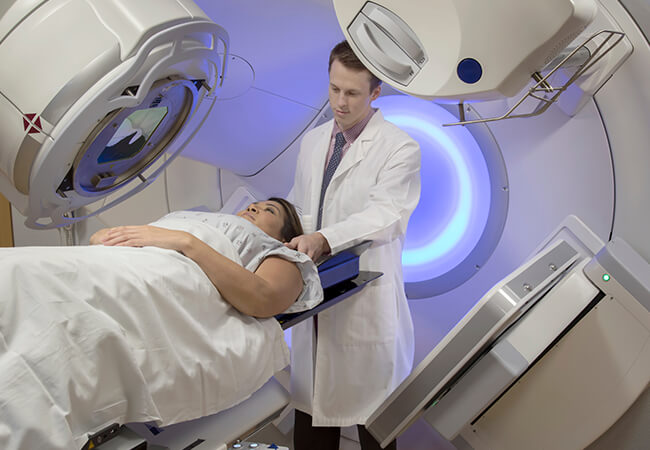


Radiation therapy, also called radiotherapy, involves the controlled use of radiation to treat cancer either for cure, or to reduce pain and other symptoms caused by cancer. It can be used alone or in combination with chemotherapy and/or surgery to successfully treat many different types of cancer. A Radiation Oncologist is a physician who specializes in delivering radiation therapy.
Advanced technologies are used to deliver safe and effective doses of radiation to patients with cancer. The goal is to precisely deliver an adequate amount of radiation dose to treat cancer while protecting as much of the surrounding normal tissue as possible.
Radiation oncologists at COHA have access to advanced technologies and use sophisticated techniques when treating with radiation, including intensity-modulated radiation therapy (IMRT), image-guided radiation therapy (IGRT), stereotactic body radiation therapy (SBRT) or stereotactic ablative body radiation (SABR), stereotactic radiosurgery (SRS) and proton therapy. Patients will also have access to the latest national and institutional clinical trials through our partnership with the University of Maryland.
Your radiation oncologist will discuss treatment options tailored for you to provide comprehensive and compassionate care close to home.
Radiation therapy uses various types of radiation to treat cancer and other disorders safely and efficiently. Special equipment sends high-energy x-rays or particles to cancer cells during this treatment. This causes the genetic material within the cells to be damaged, preventing them from growing and spreading. When this happens, the cancer cells die and are naturally eliminated by the body. Normal cells can also be harmed by radiation, but they can repair themselves in ways that cancer cells cannot.
No, radiation therapy is painless, and you cannot see, smell, or feel the radiation during its administration.
Patients have been successfully treated with radiation treatment for more than 100 years. Many advances have been made in this field to ensure it’s safe and effective.
Your radiation oncology team will carefully craft your treatment plan to ensure that you receive safe and accurate therapy. Treatment will be carefully tailored to target the cancerous areas while avoiding healthy organs in the surrounding region. Your team members will double-check and re-check your treatment plan throughout your therapy.
You won’t become radioactive during external-beam radiation treatment. However, if you get brachytherapy, small radioactive sources will be placed within your body, either temporarily or permanently, in the tumor or the tissue around the tumor. Our team will go through any specific measures you or your family and friends should take.
After internal radiation sessions, you may need to avoid touching your friends and family until the implants are removed and limit your time spent with them closely. For systemic radiation therapy, your loved ones need to avoid your bodily fluids for a few days after the treatment.
While radiation treatment is intended to target cancer cells, it can also harm or destroy normal cells in surrounding organs and tissue. This may result in certain unfavorable side effects. Before your treatment begins, our radiation oncologist will explain any potential side effects to you. Side effects also depend on the type and location of the cancer being treated and if you’re also getting treatment for a different cancer form.
Each type of treatment is distinct, and the number of treatments required will vary depending on the patient and the ailment being treated. Some individuals have only one treatment, while others receive up to 45 sessions. At the beginning of your first appointment, the radiation therapist will review your treatment objectives and goals and the number of treatments scheduled.
Radiation therapy is one of the best cancer treatment options available. Some of its benefits include: